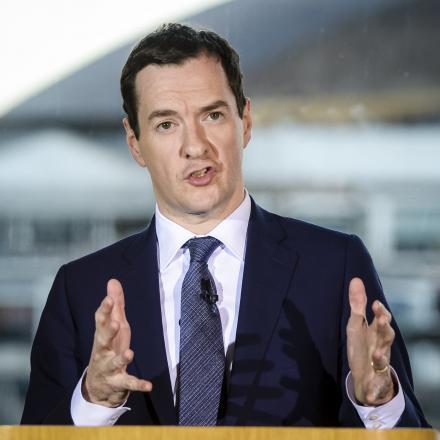
The Institute for Fiscal Studies observed that with a surplus of just £10 billion – or 0.5 per cent of national income – forecast for the last year of this parliament, the Chancellor had very little margin for manoeuvre and could be knocked off course by bad news on GDP growth, share prices or wages.
Even if he made it to the March 2019 Budget with his plans intact, the chances of Mr Osborne having to hike taxes or slash spending further were greater than one in four, the think-tank warned in its Green Budget report, published ahead of the Budget on March 16.
It said that, even if economic figures turned out well, meeting the surplus target would mean hiking fuel duties in line with inflation, taking child benefit away from more high-earning families and allowing the number of wealthy households paying the 45 per cent top rate of income tax to grow further by keeping the threshold frozen at £150,000.
Although the real-terms cuts of one per cent in public spending planned by 2019/20 were smaller than some had expected, they “won’t be easy” to deliver, the IFS said.
Labour’s John McDonnell said: “The IFS are warning what Labour has been saying for months now; that the Chancellor is gambling with the public finances and it’ll be taxpayers and our public services that will have to pay the price.”
The Shadow Chancellor claimed no one believed the targets the Chancellor had set given he hardly ever met them; noting how last year was supposed to be the year the deficit was cleared.
“But by trying to play this silly political game with his fiscal rule, instead of setting a sensible target, George Osborne is risking not equipping our economy for any dangers ahead, increasing cuts to our public services and big tax hikes for working families,” added Mr McDonnell.
But the Treasury hit back, saying: “The latest growth figures show that despite turbulence in the global economy, Britain is pushing ahead.
“With the risks we see elsewhere in the world, there may be bumpy times ahead; so here in the UK we must stick to the plan that’s cutting the deficit, attracting business investment and creating jobs.”
On current plans, total public spending in 2019/20 will reach its lowest share of national income for more than 60 years with the exception of 1999/2000 and 2000/01. Spending on public services other than health will be at its lowest level as a fraction of national income since at least 1948/49, at a time when the population continues to grow and age.
The target announced by Mr Osborne last year of running a surplus “in normal times” was “very inflexible”, said Paul Johnson, the IFS’s director, and radically different from those adopted by previous governments, which achieved surpluses only eight times in the past 60 years.
He warned that “this could come at a cost”, requiring “big tax rises or spending cuts with very little notice in order to ensure it is met”.